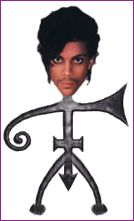Symbol
A "Symbol" or "the symbol formerly known as character" is Something that stands for something else. A symbol can be anything; it can be you, me, Puff Daddy, or something completely different. Indeed, it must be something completely different, since something cannot stand for itself. For instance, stupid is a stupid symbol for stupid, since stupid can't stand for stupid because stupid is stupid. Also, nothing can't be a symbol because nothing can't stand for anything. On the other hand, everyone should stand for the Pledge of Allegiance but they don't.
My sister and your girlfriend can be symbols, but not the same symbol if you know what's good for you. X is a symbol which generally marks the spot, Y that is, I do not know, but U might. Symbols can be combined into combinations called symbol combinations, e.g. "first let's have some beer, and then we can sleep." Symbol combinations are best known for their usage in art and literature, which charmed French 16th-century concubines.
Common symbols

Famous $ymbols
Symbolic combinations
- XXX
- The Alphabet
- AEIOU
- FU
- OMG


Common sympol misfakes
- "->" is actually a perversion of "-" and ">".
Symbols' quest to become a musical instrument
Ever since they were first confused with cymbals, symbols have vied for induction into the international guild of musical instruments. Recent efforts have included: attempting to mimic drums (which only ended up hurting ☺), trumpets (which involved Ѻ blowing Γ which isn't that unusual) and guitars which failed miserably.
It is not known what the actual musical instruments think of these vain attempts but it is rumored that the bassoons have taken pity on the poor things and have sided with them in their quest. This of course has divided the instruments into almost waring factions over something so simple.
Symbolism
The worship of symbols dates back at least to the 18th century B.C.E. Its origins are uncertain, but it is recorded the ancient Hebrew book of Genesis as early as chapter 31 when the heroine Rachel steals a set of sacred symbols from her father. According to Religious Symbolism expert John "Don't quote me on this" Smith, "The Symbols underly nearly every concept of every existing religion. By this measure, Symbolism is the ultimate universal religion." Fundamentalist Symbolists take this concept even further. Says fourth-generation Symbolist Delta Vee, "Ultimately, the great Symbols are stand-ins for the deepest truths. Since we don't understand the Ultimate Truth, the only way to approach it is with Symbols."
Wikipedia explains it from a more NPOV, saying that the Symbols created "a resonant mythos that expresses the moral values of the society, the teachings of the religion, [...] a sense of solidarity between religious adherents [and] functions as a way to bring an adherent closer to their god or gods." However, that statement may just be a deliberate misquote. Nevertheless, the article goes on to claim that "The study of religious symbols is either universalist, [or] within the confines of a religion's limits and boundaries."
Note that although physicists and mathematicians have recently discovered the meanings of several well-known Symbols, such as π and =, they cannot agree on the majority. For example, they claim to have shown "X" to stand for thousands, if not millions, of different moral values.




